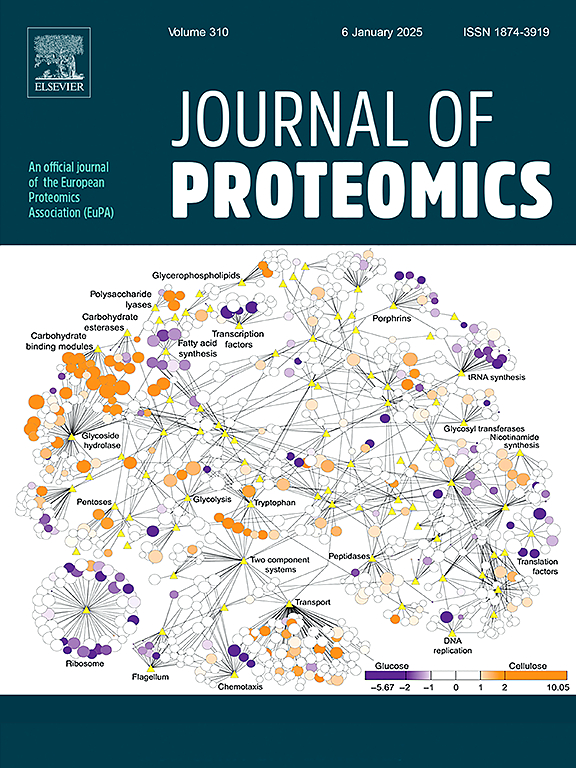Multi-omics reveals miR-181a-5p regulates PPAR-driven lipid metabolism in Oral squamous cell carcinoma: Insights from CRISPR/Cas9 knockout models
IF 2.8
2区 生物学
Q2 BIOCHEMICAL RESEARCH METHODS
引用次数: 0
Abstract
Oral squamous cell carcinoma (OSCC) remains a therapeutic challenge due to its complex molecular landscape and metabolic adaptability. This study integrates proteomic and transcriptomic analyses to investigate the role of miR-181a-5p in OSCC pathogenesis using CRISPR/Cas9-generated whole-body knockout (KO) mice. By inducing OSCC with the chemical carcinogen 4-nitroquinoline 1-oxide (4NQO), we identified significant dysregulation of lipid metabolism-associated proteins and tumor regulators in miR-181a-5p-KO tumors compared to wild-type controls. Quantitative proteomics revealed enrichment of the PPAR signaling pathway, with 12 key genes upregulated in KO mice, mechanistically linking miR-181a-5p deficiency to enhanced lipid droplet biogenesis and immunosuppressive microenvironments. Serum biomarker validation demonstrated elevated Cyfra21–1, SCC-Ag, and ISG20 levels in KO mice, correlating with tumor aggressiveness and radioresistance. Multi-omics integration further identified a diagnostic-prognostic protein signature with 89 % specificity for miR-181a-5p-deficient OSCC subtypes. These findings establish miR-181a-5p as a master regulator of PPAR-mediated metabolic reprogramming and immune evasion, offering novel proteome-driven insights into therapeutic targeting of lipid metabolism and biomarker discovery in OSCC.
Significance
This study integrates transcriptomic and proteomic analyses to elucidate the critical role of miR-181a-5p in regulating lipid metabolism via the PPAR signaling pathway during oral squamous cell carcinoma (OSCC) pathogenesis. Loss of miR-181a-5p enhances lipid metabolism, promoting membrane biosynthesis and metastasis. Multi-omics profiling identified a specific diagnostic-prognostic protein signature, highlighting CES3 and ISG20 as potential biomarkers for early diagnosis and therapeutic targeting in miR-181a-5p-deficient OSCC. The research establishes a foundation for miRNA-based liquid biopsy and PPAR-targeted nanotherapy. Mouse knockout models recapitulating human OSCC spatial biology validated miR-181a-5p's role in tumor initiation.

多组学揭示miR-181a-5p调节ppar驱动的口腔鳞状细胞癌的脂质代谢:来自CRISPR/Cas9敲除模型的见解
口腔鳞状细胞癌(OSCC)由于其复杂的分子结构和代谢适应性,仍然是一个治疗挑战。本研究结合蛋白质组学和转录组学分析,利用CRISPR/ cas9产生的全身敲除(KO)小鼠研究miR-181a-5p在OSCC发病机制中的作用。通过用化学致癌物质4-硝基喹啉1-氧化物(4NQO)诱导OSCC,我们发现与野生型对照相比,miR-181a-5p-KO肿瘤中脂质代谢相关蛋白和肿瘤调节因子的显著失调。定量蛋白质组学显示PPAR信号通路富集,12个关键基因在KO小鼠中上调,机制上将miR-181a-5p缺乏与脂滴生物发生增强和免疫抑制微环境联系起来。血清生物标志物验证显示,KO小鼠中Cyfra21-1、SCC-Ag和ISG20水平升高,与肿瘤侵袭性和放射耐药性相关。多组学整合进一步确定了对mir -181a-5p缺陷OSCC亚型具有89%特异性的诊断-预后蛋白特征。这些发现证实了miR-181a-5p是ppar介导的代谢重编程和免疫逃避的主要调节因子,为OSCC中脂质代谢的治疗靶向和生物标志物的发现提供了新的蛋白质组驱动的见解。本研究结合转录组学和蛋白质组学分析,阐明了miR-181a-5p在口腔鳞状细胞癌(OSCC)发病过程中通过PPAR信号通路调节脂质代谢的关键作用。miR-181a-5p的缺失会增强脂质代谢,促进膜生物合成和转移。多组学分析确定了一个特定的诊断-预后蛋白特征,强调CES3和ISG20是mir -181a-5p缺陷OSCC早期诊断和治疗靶向的潜在生物标志物。该研究为基于mirna的液体活检和ppar靶向纳米治疗奠定了基础。重现人类OSCC空间生物学的小鼠敲除模型验证了miR-181a-5p在肿瘤起始中的作用。
本文章由计算机程序翻译,如有差异,请以英文原文为准。
求助全文
约1分钟内获得全文
求助全文
来源期刊

Journal of proteomics
生物-生化研究方法
CiteScore
7.10
自引率
3.00%
发文量
227
审稿时长
73 days
期刊介绍:
Journal of Proteomics is aimed at protein scientists and analytical chemists in the field of proteomics, biomarker discovery, protein analytics, plant proteomics, microbial and animal proteomics, human studies, tissue imaging by mass spectrometry, non-conventional and non-model organism proteomics, and protein bioinformatics. The journal welcomes papers in new and upcoming areas such as metabolomics, genomics, systems biology, toxicogenomics, pharmacoproteomics.
Journal of Proteomics unifies both fundamental scientists and clinicians, and includes translational research. Suggestions for reviews, webinars and thematic issues are welcome.
 求助内容:
求助内容: 应助结果提醒方式:
应助结果提醒方式:


